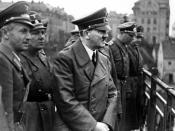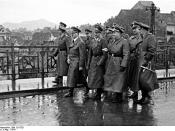Martin Bormann was a prominent Nazi who served as Private Secretary to Adolf Hitler and by the early 1940s had become head of the Parteikanzlerei (Party Chancellery). Despite his apparent lack of skill and imprisonment for murder in the 1920s, Bormann rose through the German ranks, eventually wielding a huge amount of power in administering Hitler's personal finances, paperwork, appointments and ultimately controlling all information. However, although Hitler described him as his `most faithful Party comrade', Bormann's exact role remains shrouded in mystery and conjecture, and continues to be a source of debate among historians.
Personal Life and Background
Martin Bormann, son of a former Prussian regimental sergeant-major, was born on June 17th 1900 in Halberstadt, Central Germany. Brought up by his mother and step-father, a prominent bank director, he began to form a strong view that German culture was superior to all others from an early age.
At the age of nine his family moved to Weimar, the then capital of Germany and notorious for its public and violent anti-Semitism, an atmosphere that was to heavily influence Bormann's ideology. He attended the local secondary school for several years before dropping out prematurely to work on a farming estate. After serving briefly as a cannoneer in a field artillery regiment at the end of World War I, Bormann soon joined the rightist Rossbach Freikorps in Mecklenburg. In March 1924 he was sentenced to one year imprisonment as an accomplice of Rudolf HÃÂöss in the vengeance murder of Walther Kadow, a supposed betrayer of the proto-Nazi Leo Schlageter to the French occupation authorities in the Ruhr.
He married Gerda (a rabid Nazi and daughter of Supreme Party Judge, Walter Buch) in 1929 with whom he had ten children, the eldest christened Adolf, in honour of his godfather. However,


